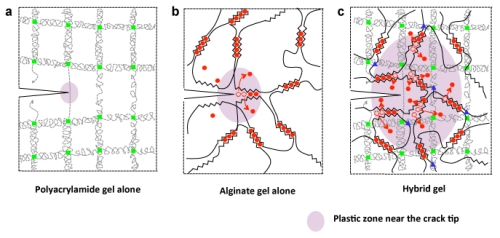A multidisciplinary team at Harvard has created an exceptionally tough and stretchy gel, which is also biocompatible and self-healing.
 By themselves, polyacrylamide gels (a) and alginate gels (b) are brittle. The new hydrogel (c), however, has a more complex molecular structure that helps to dissipate stress across a wide area. The red circles represent calcium ions, and the blue triangles and green squares represent covalent crosslinks between chains. (image courtesy of Jeong-Yun Sun and Widusha R. K. Illeperuma.)
By themselves, polyacrylamide gels (a) and alginate gels (b) are brittle. The new hydrogel (c), however, has a more complex molecular structure that helps to dissipate stress across a wide area. The red circles represent calcium ions, and the blue triangles and green squares represent covalent crosslinks between chains. (image courtesy of Jeong-Yun Sun and Widusha R. K. Illeperuma.)
These qualities make the gel a potential replacement for damaged cartilage in human joints and pave the way for new opportunities in tissue engineering and medicine. This water-based gel is stretchable by 21 folds its original length.
The researchers have described the properties and synthesis technique of the hydrogel in the Nature journal. The researchers used two common polymers, namely polyacrylamide and alginate, to synthesize the tough new hydrogel. Separately, polyacrylamide and alginate are weak gels. However, when the polymers are mixed in an 8:1 ratio, they create a complex cross-linked chain network wherein the chains strengthen each other. The network’s chemical structure enables the molecules to get disintegrated mildly over a huge area rather than letting the gel to break.
The alginate part of the gel comprises polymer chains that create weak ionic bonds with each other, detaining calcium ions introduced into the water during the process. When the gel is extended, these calcium ions get released due to the breakage of some of the weak ionic bonds, causing the gel to expand to a little, however, the polymer chains themselves stay together.
Meanwhile, polyacrylamide chains create a grid-like structure that covalently links with the alginate chains. Hence, when the gel experiences a small crack when it extends, the polyacrylamide grid facilitates the distribution of the pulling force over a huge area, thus pulling and breaking the alginate's ionic bonds randomly.
The key feature of the new hydrogel is its capability to maintain its toughness and elasticity over numerous stretches. The weak ionic bonds between the calcium and the alginate can reunite during the relaxation time between the stretches. The researchers have demonstrated the possibility of accelerating this process by increasing the ambient temperature.
According to the researchers, the new hydrogel can be utilized as a model system to study the mechanisms of hydrogels. The new material holds potential in optics, soft robotics, and artificial muscle that gives protection for wounds, as well as in areas that require extremely stretchy and tough hydrogels.